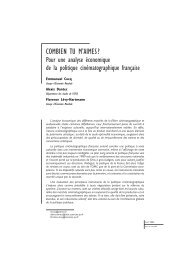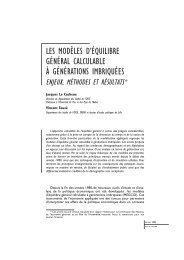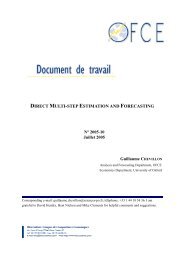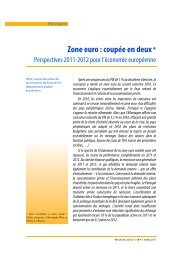N° 2005-09 Juin 2005 Guillaume Daudin* Jean-Luc Gaffard ...
N° 2005-09 Juin 2005 Guillaume Daudin* Jean-Luc Gaffard ...
N° 2005-09 Juin 2005 Guillaume Daudin* Jean-Luc Gaffard ...
Create successful ePaper yourself
Turn your PDF publications into a flip-book with our unique Google optimized e-Paper software.
Offshore Outsourcing in the EU Financial Services IndustryEuropean banking supervisors began work in 2002 on developing high level principlesthat could be used to help the convergence of supervisory approaches and practices in relationto outsourcing. They are based on a range of current practices and the common elements ofpolicy that have been to date in various Member States. CEBS is proposing a three-tierclassification of activities in a consultation paper: 1) Strategic or “core activities” whichcannot be outsourced; 2) Non-strategic but “material activities” 18 , which should be prenotifiedto the supervisory authority and 3) Non-strategic and “non-material activities”, whichdo not have to be pre-notified but for which the institution must remain responsible forensuring any supervisory guidelines are still met (CEBS, 2004).In February <strong>2005</strong>, the Joint Forum 19 releases outsourcing guidance for financial servicesfirms. This report untitled Outsourcing in Financial Services develops a set of principles thatgive guidance to companies (banking, securities and insurance) and regulators to help thembetter mitigate risks without hindering the efficiency and effectiveness of firms. It focuses onestablishing coherent policy and risk management programmes for outsourcing activities. Thenine principles suggested can be grouped broadly into three categories. The first categoryrefers to the policies that regulated financial services firms should have in place even beforeentering an outsourcing agreement. The second category addresses concerns surroundingspecific outsourcing arrangements. Outsourcing relationships should be governed by writtencontracts that clearly describe all material aspects of the outsourcing arrangement, includingthe rights, responsibilities, and expectations of all parties. The third category addressesconcerns specific to supervisors. Supervisors should take into account outsourcing activitiesas an integral part of their monitoring responsibilities. Supervisors should also assurethemselves that outsourcing arrangements do not hamper the ability of the firm to meet itssupervisory requirements (i.e., supervisors should be able to obtain promptly any relevantmaterials regarding outsourcing activities).Outsourcing by financial services firms raises important concerns for both the firms andtheir supervisors. Specific supervisory efforts are currently in place and more are indevelopment. However, such efforts will need to be flexible and will most probably bemodified over time as the nature of these outsourcing arrangements evolves. The principles on18 It is hard to make a clear distinction between “core activities” and “material activities”. A more pragmaticapproach would be to consider that a firm may outsource any of its activities, on condition that it is capable ofcontrolling the attendant risks.19 A financial services policy group established by the Basel Committee on Banking Supervision, theInternational Organization of Securities Commissions (IOSCO), and the International Association of InsuranceSupervisors.46








